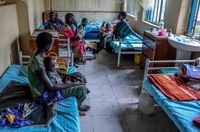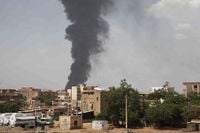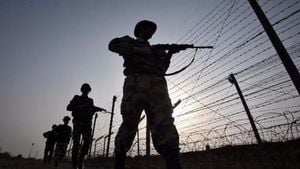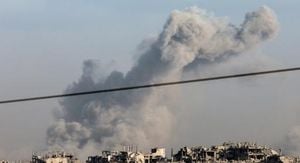For more than a year, Sudan’s North Darfur region has been gripped by a relentless siege, its capital El Fasher battered by violence, hunger, and displacement. This once-bustling city now stands at the epicenter of what United Nations officials and humanitarian agencies describe as the world’s worst humanitarian crisis—a catastrophe that’s rippling far beyond Sudan’s borders and threatening to destabilize the entire region.
On September 20, 2025, UN Secretary-General António Guterres issued a stark warning about the “rapidly deteriorating situation” in El Fasher. According to a statement from his office, the city, under siege by the paramilitary Rapid Support Forces (RSF) for over 500 days, has seen attacks against civilians intensify in recent weeks. The UN chief called for “an immediate cessation of hostilities in El Fasher, as well as for the respect and protection of civilians and for the facilitation of safe, unhindered and sustained humanitarian access.” He urged both the RSF and the Sudanese Armed Forces (SAF) to engage in dialogue and return to negotiations for a sustainable political solution, emphasizing that “the fighting must stop now.”
The urgency of Guterres’s plea was underscored by a horrific event the day before: a drone attack during dawn prayers at Al-Safiya Mosque in El Fasher killed more than 70 worshippers, including children. The UN Humanitarian Coordinator in Sudan, Denise Brown, condemned the strike as a war crime, stating, “It is also a war crime to intentionally direct attacks against buildings dedicated to religion. This attack, reportedly carried out by the RSF, must be investigated and the perpetrators held accountable.” The attack also reportedly hit a UNICEF-supported water truck, further hampering aid efforts in a city already cut off from basic necessities.
Humanitarian organizations have raised the alarm about the growing hunger crisis in El Fasher. Hundreds of thousands remain trapped without access to food, medicine, or other essentials. As of late August, UNICEF estimated that 600,000 people had been displaced from the city. Repeated RSF strikes have destroyed civilian infrastructure, including hospitals, schools, and displacement centers. The UN’s humanitarian agency OCHA called the attack “unacceptable” and demanded respect for international humanitarian law and the safety of aid workers.
The conflict between the RSF and SAF, which erupted in April 2023, has devastated Sudan. According to the UN, thousands have been killed, millions displaced, and the humanitarian situation is now considered the worst in the world. Independent sources put the death toll as high as 150,000, while the UN refugee agency, UNHCR, estimates that over 12 million people have been forced from their homes—making Sudan the site of the largest forced displacement crisis globally.
Conditions in and around El Fasher have worsened dramatically since famine was identified in the area last year. The World Food Program warns that Sudan could soon face the largest hunger crisis in modern memory, with 25 million people at risk of acute starvation. In North Darfur alone, over 40,000 children have been treated for severe acute malnutrition in the first five months of 2025, double the number from the same period last year. Hunger is closely followed by disease: more than 600,000 children under five face life-threatening cholera outbreaks, and diseases like dengue and malaria are spreading largely unchecked. Neighboring Chad, which hosts a third of new refugee arrivals, is also at serious risk of disease transmission.
The violence and deprivation in Sudan have spilled over into South Sudan, compounding an already dire hunger crisis. At a hospital in Bor, South Sudan, 14-month-old Adut Duor lies severely malnourished and unable to walk—one of 2.3 million children under five in need of acute malnutrition treatment, according to a UN-backed report. Over 700,000 of these children are in severe condition, and 1.1 million malnourished pregnant and lactating women are struggling to feed their children. Funding cuts have forced aid organizations like Save the Children to reduce staff and close malnutrition centers, while supplies of vital therapeutic foods are running dangerously low. Violence in northern states blocks humanitarian access and displaces farming communities, exacerbating food insecurity. Flooding and failed harvests have put 1.6 million people at risk of displacement, and poor sanitation and disease outbreaks further compound the crisis.
At Maban County Hospital near the Sudan border, shortages of nutritional supplies and unpaid staff highlight the strain on health services. Economic pressures, including inflation and disrupted trade, have left 92% of South Sudanese living below the poverty line. Corruption in South Sudan has siphoned billions from public funds, undermining health and food security efforts. UN investigators warn that corruption fuels conflict and deepens hunger, while the government allocates only a fraction of its budget to health care.
The scale of the crisis in Sudan and its neighbors has drawn international condemnation and calls for action. The African Union’s chairperson, Mahmoud Ali Youssouf, condemned the drone strike in El Fasher as a “heinous” and “flagrant violation of international law.” A UN report released in September 2025 highlighted worsening summary executions, targeting of civilians, and ethnic violence, particularly in Darfur. The International Criminal Court briefed the UN Security Council in July 2025, stating that war crimes and crimes against humanity were being committed in Darfur. “Rape and sexual violence are being weaponised. Abductions for ransom or to bolster the ranks of armed groups have become common practice,” ICC prosecutor Nazhat Shameem Khan reported.
Sudan’s Prime Minister Kamil Idris has pledged to raise the situation in El Fasher at the UN General Assembly in New York, where world leaders are gathering for its 80th session. The UN Secretary-General’s Personal Envoy for Sudan, Ramtane Lamamra, has expressed readiness to support genuine efforts to end the conflict and establish an inclusive political process. Meanwhile, the U.S. has provided more than 650,000 metric tons of wheat and flour to 7 million displaced Sudanese inside the country and supports 4 million refugees in Chad and South Sudan, according to former USAID Administrator Mark Green. Yet, as humanitarian aid dwindles and violence persists, millions remain at risk.
The conflict’s reverberations extend beyond humanitarian suffering. Sudan’s instability threatens a strategically vital arc stretching from the Sahel to the Red Sea shipping lanes, increasing risks of extremist groups, arms trafficking, and foreign exploitation. Russian proxies have reportedly secured access to gold mines and potential naval facilities in Sudan, while China is deepening its economic footprint with infrastructure deals that carry long-term costs.
As the siege of El Fasher continues and hunger tightens its grip on Sudan and neighboring South Sudan, the calls for global action grow louder. The fate of millions hinges on whether the world can muster the compassion, resources, and political will to halt the violence, deliver aid, and support a path to peace.





